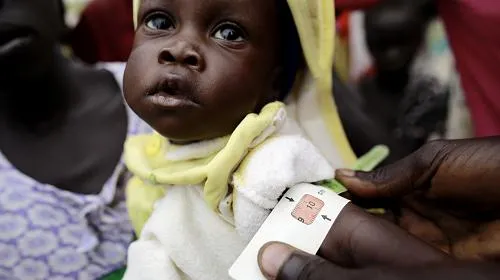Half the population of South Sudan are facing extreme hunger.
JUBA, South Sudan (June 21, 2017) — Areas of South Sudan in famine have improved, but the country is experiencing the most alarming levels of food insecurity in its history, according to an early warning famine report released today. In June and July, the number of people suffering from extreme hunger will hit 6 million, up from 4.9 million in January. That is half of the population in South Sudan – the highest number ever recorded in the country. The greatest impact is among people who are displaced within South Sudan due to the conflict and the host communities where they sought safety.
However, the number of people facing famine conditions decreased from 100,000 to 45,000, due to humanitarian aid reaching the areas of Leer, Mayendit and Koch counties where famine was declared earlier this year.
“People that fled to the Protection of Civilian sites last year are now returning home to burnt houses in southern Unity, uncultivated fields and limited health services. They have nothing to feed their families with, except water lilies in the swamps where they collect water from,” said Valentina Mirza, assistant country director for CARE in South Sudan.
“A woman we talked to had just returned from a seven day trip on foot to receive food rations for her family. The small silver lining is that that humanitarian agencies can from now on access her village with food assistance and agricultural inputs. So she will be able to cultivate in the upcoming season to feed her family.”
Three years of brutal civil war has contributed to an economic crisis and below average harvest that continues to send food prices skyrocketing. The result has been a food crisis that continues to spread throughout the country.
According to the early warning report, there are new areas of South Sudan reaching emergency levels of food crisis, which is just one level above famine. These are areas where people have been recently displaced because of outbreaks of the conflict that drove them off their land leaving them with no access to food and their agricultural livelihoods. For example, in Jonglei State, there have been 200,000 people recently displaced.
“The food crisis is rapidly deteriorating in new areas of the country where violence is breaking out and the people who are starving have not been accessible due to the conflict. It’s the unfortunate recipe for famine, and urgent humanitarian assistance must be allowed to avert more catastrophe from spreading across the country,” said Mirza.
“Sadly these senseless deaths and human suffering will only continue, unless this merciless conflict is finally brought to an end.”
CARE is providing assistance in health and nutrition for mothers and children under five years old, food and livelihoods assistance, peace building and sexual and physical violence prevention across four states including some of the worst affected by conflict. Since the crisis began in 2013 CARE has assisted over 350,000 people across Greater Unity, Upper Nile, Jonglei and Eastern Equatoria Regions of South Sudan.
About CARE
Founded in 1945, CARE is a leading humanitarian organization fighting global poverty. CARE has more than six decades of experience helping people prepare for disasters, providing lifesaving assistance when a crisis hits, and helping communities recover after the emergency has passed. CARE places special focus on women and children, who are often disproportionately affected by disasters. To learn more, visit www.care.org.
Media Contacts
Nicole Harris, media relations manager, 404-735-0871, nharris@care.org

